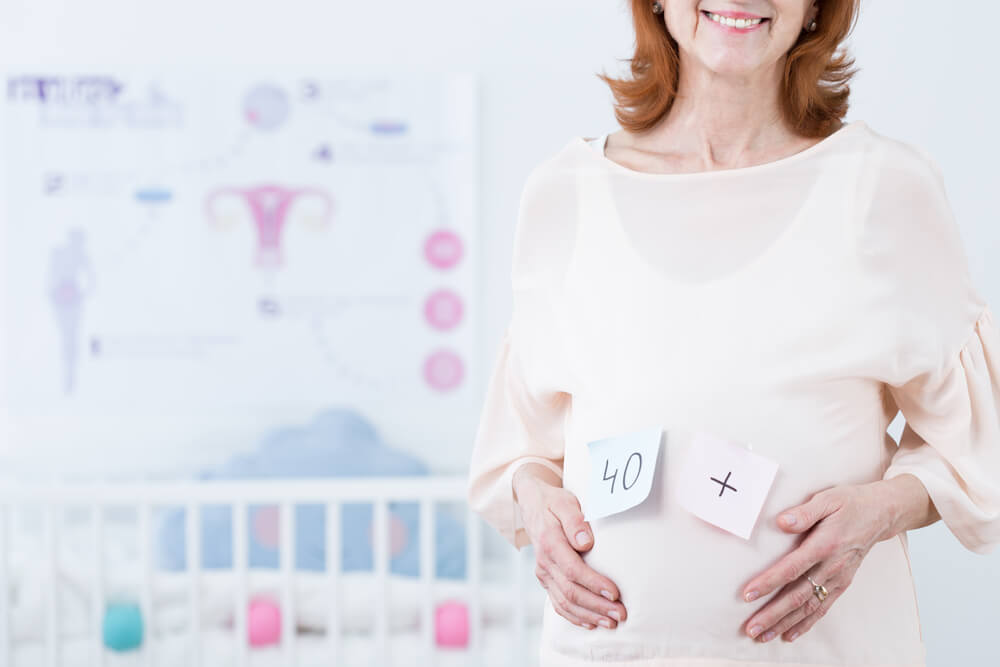You are pregnant for the first time at age 35. Or you had a baby or in your 20s and then maybe one in your early 30s. At 35, you decide to have another baby and suddenly your pregnancy is reclassified as a geriatric or high-risk pregnancy.
Why is giving birth at age 35 a turning point in the reproductive cycle of a woman?
What is advanced maternal age (AMA)?
Also referred to as a geriatric pregnancy, advanced maternal age pregnancy is a medical term used to describe women who are over the age of 35 when they conceive a baby. Also referred to as a geriatric pregnancy, the age of 35 is when medically your likelihood of conceiving a baby decreases while the risk factors for complications such as miscarriage, hypertension, and congenital disorders increases.
The statistics provided by the United States Census Bureau indicate the median age for women having their first child has increased from 27-30. Pregnancy rates in younger women have dropped dramatically while pregnancy rates for women ages 35-39 have increased by 67%. According to a recent article in the NY Times, more than 100,00 Americans are having babies after the age of 40.
We have personally seen this trend in our OBGYN practices in South Miami and Downtown Doral. The mean age for first pregnancies has noticeably increased and the trend of women waiting for financial and relationship security before having a baby is very much in evidence.
But the positive side is also very apparent. Our physicians at South Miami OB-GYN Associates successfully deliver healthy babies to women who have been classified as advanced maternal age every year. We believe that if you want to have a baby after age 35, your age should not be a deterrent. However, it’s important to keep your prenatal appointments, maintain a healthy lifestyle and explore available diagnostic procedures to minimize the risks associated with a high-risk pregnancy.
Prefer a male or a female OBGYN? We have both male and female OBGYNs in our practice. Schedule your appointment online with us today.
The Risk Factors of Advanced Maternal Age Pregnancy

There are risks associated with every pregnancy. But with advanced maternal age you are at greater risk for:
- Infertility: Should infertility be considered a risk factor? According to the American College of Obstetricians and Gynecologists, the number and quality of a woman’s eggs begin to decline at age 30 and decline rapidly with advanced maternal age. What that means is that your chances of getting pregnant decrease with age so you run the risk of not getting pregnant.
- Preeclampsia and Gestational Diabetes: As a woman ages, her risk of developing high blood pressure or abnormally high blood sugar during pregnancy increases. These medical conditions can not only be dangerous for the mom but also problematic for the pregnancy, possibly leading to premature delivery and low infant birth weight.
- C-Section delivery: According to a 2019 study, the C-section rate in women of advanced maternal age is nearly double that of younger mothers. While C-sections can be life-saving, the procedures carry a risk of infection, blood clots, and excessive bleeding.
- Chromosomal issues: The older the egg, the greater the likelihood of chromosomal issues which can increase the risk of genetic disorders such as Down syndrome. Check out these statistics: The risk of Down syndrome is 1 in 1250 for women age 25 and 1 in 100 for women who conceive at age 40. This happens because of errors in meiosis, where a piece on a chromosome breaks off and attaches to another chromosome. The extra part of the number 21 chromosome causes the features of Down syndrome.
- Multiple births: The thought of having twins or triplets can have tremendous appeal to some women. As women age, they are at a higher risk of carrying multiples, aka more than one baby at a time. Multiple births are considered higher-risk pregnancies than a single birth. Possible complications include premature labor, preeclampsia, gestational diabetes, placenta abruption, or intrauterine growth restriction (IUGR).
- Miscarriages and Stillbirths: Experiencing a miscarriage or giving birth to a stillborn baby can happen at any age, but the risk increases as you get older. Miscarriages are generally caused by chromosomal abnormalities. The risk for miscarriage between the age of 35-40 is 20-30%. The risk increases significantly after the age of 40. Studies also suggest that having a baby in your 40s increase your risk for a stillborn.
- Breast Cancer: Many women are familiar with the increased incidence of preeclampsia and gestational diabetes. But the slightly higher risk of developing breast cancer for women who have their first baby after age 40 should be considered.
Women with advanced maternal age are generally treated like any other pregnant patient though we tend to be more vigilant about your glucose level and your blood pressure. Your prenatal care is very important to us, particularly because of the increase in risks.
The good news is you can lower your risks of pregnancy complications by:
- Proactively preparing your body for a healthy pregnancy before you get pregnant
- Taking control of any medical problems like diabetes before becoming pregnant
- Proactively taking a prenatal vitamin before you get pregnant
- Stop smoking and drinking alcohol
- Eating a healthy diet
- Exercising regularly
- Maintaining a healthy weight range
- Keeping all your prenatal appointments
- Reducing your stress levels
Additional Diagnostic Procedures for Women with Advanced Maternal Age

Every year, new diagnostic tests are developed to help minimize the risks for women with advanced maternal age. Genetic screening tests are recommended for all pregnant women but are particularly important for high-risk pregnancies.
- Noninvasive tests such as ultrasound or blood tests can detect the possibility of a genetic problem.
- Invasive genetic tests such as chronic villus sampling (CVS) and amniocentesis can be scheduled if a problem is detected in an ultrasound or blood test.
If there is a concern about the health of the baby, your OBGYN may refer you to a maternal-fetal medicine specialist who specializes in high-risk pregnancy.
Our message to patients with advanced maternal age
Age is just a number. Most pregnancies are healthy and successful and we are committed to your health and the health of your baby. The key is to keep the lines of communication open with your OBGYN, follow the recommendations and maintain a healthy lifestyle.
Together we can optimize your chances for a successful pregnancy and healthy baby.
Schedule your appointment online with South Miami OB-GYN Associates today in either our South Miami or Downtown Doral office or call 305.665.1188.



